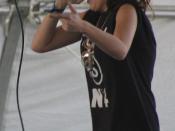The pop music genre is teeming with the voices of women. Tune in to a pop station, or even one of the many "hot mix" channels radio offers that play Billboard Top 100 hits and it's hard not to notice the abundance of women and even young girls in the pop and hip-hop branches. Listening in only on rock stations on the radio may leave you puzzling at the domination of male vocals; "where are the females?" you may ask yourself. Mainstream rock-- that is, rock by artists still active in the music industry and featured on FM airways -- currently hosts two female vocalists, Amy Lee of Evanescence and Lacey Mosely of Flyleaf. Given that rock is the genre where the roots of Riot Grrrl, a brash and in-your-face feminist development in music with bands like Bikini Kill, Bratmobile, Hole, and Babes in Toyland, ran deep in the early 1990s, it may come as a surprise to learn that the only ladies in mainstream rock don't offer the tales of female experiences or even views on women in popular culture that the Grrrl musicians of the 90s related.
Even more surprising to learn, is that a very resolute female with strong opinions and willing criticism of women in pop culture has emerged in the hip-hop domain, of all places, generally dominated by males or occupied by highly sexualised females. Another outspoken voice in the name of women has been working in the pop/R&B field for just a little under seven years (wikipedia.org). These women are Lady Sovereign, and P!nk (pronounced "pink"), respectively, and they're making use of their voices in mainstream music to communicate their stances on female issues in modern society, a beautiful working example of popular music as a public discourse.
Perhaps presenting workable definitions of...


